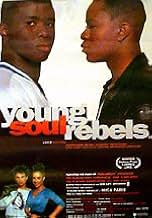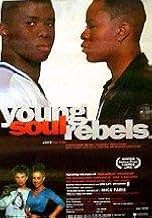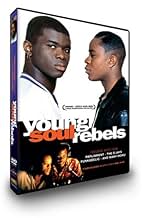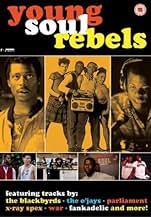Two disc jockeys have a friend's murder to solve in the fringe-group melting pot of 1977 London.Two disc jockeys have a friend's murder to solve in the fringe-group melting pot of 1977 London.Two disc jockeys have a friend's murder to solve in the fringe-group melting pot of 1977 London.
- Director
- Writers
- Stars
- Awards
- 1 win total
Eamonn Walker
- Carlton
- (as Eamon Walker)
- Director
- Writers
- All cast & crew
- Production, box office & more at IMDbPro
Featured reviews
I am currently writing a paper on this film and another for one of my film classes, Topics in National Cinemas, as it was one of the films we examined. While perusing this page for certain information I needed i happened to read the previous comment that someone had posted regarding what they thought of the film.
While reading this individual's comments it occurred to me that they COMPLETELY misunderstood the film and what it set out to challenge and address. This film is NOT a murder mystery. Yes, a murder occurs and sets off the story, but it is no more essential to the plot than is the youth in a coma in La Haine (Kassovitz, 1995). Like La Haine, this film sets out to address social issues pertaining to race, class, positioning in the political landscape, and, unlike La Haine, sexuality (which seemed to greatly disturb the previous individual who posted).
Young Soul Rebels examines the social landscape of late 1970s Britain, and particularly how it affects youths within the greatly marginalized "Black" culture. It confronts issues of diaspora, through the juxtaposition of different aspects of the "Black" culture, as in the rastas working at the garage, compared with the two, funk obsessed (and much more "Afro-English") main characters. It also looks at the intersection at which certain sub-cultural borders collide, as in the Punks, the Funks, and the Reggaes, as well as Hetero and Homosexuality. Ultimately this notion of collision is key to understanding this film for what it is, which is precisely identities in collision. If the previous individual who posted had understood this, then they would have also seen how the murderer's motives implied this idea of identity collision, were driven by it and pertained more to it than to reading the film as a simple "whodunnit." In this light, you'll also find that music drives the film, both as a signifier for identities, and as an expression of them. Music is certainly an essential component to this film.
For more information regarding the issues this film juggles, and for a greater understanding of its concepts and meanings, look at the writings of Paul Gilroy, particularly his book "Ain't No Black in the Union Jack," and the film's director, Isaac Julien.
While reading this individual's comments it occurred to me that they COMPLETELY misunderstood the film and what it set out to challenge and address. This film is NOT a murder mystery. Yes, a murder occurs and sets off the story, but it is no more essential to the plot than is the youth in a coma in La Haine (Kassovitz, 1995). Like La Haine, this film sets out to address social issues pertaining to race, class, positioning in the political landscape, and, unlike La Haine, sexuality (which seemed to greatly disturb the previous individual who posted).
Young Soul Rebels examines the social landscape of late 1970s Britain, and particularly how it affects youths within the greatly marginalized "Black" culture. It confronts issues of diaspora, through the juxtaposition of different aspects of the "Black" culture, as in the rastas working at the garage, compared with the two, funk obsessed (and much more "Afro-English") main characters. It also looks at the intersection at which certain sub-cultural borders collide, as in the Punks, the Funks, and the Reggaes, as well as Hetero and Homosexuality. Ultimately this notion of collision is key to understanding this film for what it is, which is precisely identities in collision. If the previous individual who posted had understood this, then they would have also seen how the murderer's motives implied this idea of identity collision, were driven by it and pertained more to it than to reading the film as a simple "whodunnit." In this light, you'll also find that music drives the film, both as a signifier for identities, and as an expression of them. Music is certainly an essential component to this film.
For more information regarding the issues this film juggles, and for a greater understanding of its concepts and meanings, look at the writings of Paul Gilroy, particularly his book "Ain't No Black in the Union Jack," and the film's director, Isaac Julien.
firstly this film has some mistakes in it,i was a soul girl back int he day,punks and soul boys weren't pally,but not enemies either,the didn't go to the same clubs,the fashion is correct but the music is out of time ,some of the music came out maybe up to 2 years later,that apart it does pick up the atmosphere of the day and the vibe and is at least acknowledging the soul scene,and the cult of soul boys and girls ,a major thing,but very unknown which is odd,i guess the write must have a bit of info of the movement,still as a fun film its OK and does bring a few
memories i think unless you were part of the scene you would find this
a bit dull,it is hollow ,but the clothes and dancing are all spot on,although gay guys did have there own disco clubs,again fairly underground as back then it wasn't as tolerated as it is,rightly so,now as so many other films have been made about punks and skinheads it god to see a movie reflecting a little known but extremely popular movement
memories i think unless you were part of the scene you would find this
a bit dull,it is hollow ,but the clothes and dancing are all spot on,although gay guys did have there own disco clubs,again fairly underground as back then it wasn't as tolerated as it is,rightly so,now as so many other films have been made about punks and skinheads it god to see a movie reflecting a little known but extremely popular movement
Johnny Mills , as one of the skinhead kissing gay punks in the night club , is the highlight of this movie. He also appeared with Tilda Swinton in Derek Jarman's The Garden 1990.
I am amazed at the lack of knowledge displayed by the previous reviewer. I first saw this film in the 90s and watched it again last night. I was part of this general scene in southern England at that time and I have to say that the music, dancing and fashions are completely accurate. This nonsense about Afros and flares, that belonged in the early 70s, by 77 all that had changed. And yes, punks and soul boys were mixing in the clubs, fashions crossed over even earlier, the plastic "jelly" sandals and winkle picker shoes, all adopted from the punks in late 76/77.If anybody had walked in with flares there would have been howls of laughter.
Firstly, lets get the negatives ironed out and set the record straight.
Yes, the plot gets a bit lost towards the end, yes some of the acting is questionable, yes some of the storyline is a little far fetched. If we judged every film we saw on those merits alone we'd be very shallow people! Thank heavens British Cinema gets away with making films like this, that represent British History, Culture and lifestyle in a non-conformist, sensitive and "path less trodden" view.
Yes it has a gay story line... and to correct another review only ONE of the two central characters is gay. What sets this film apart if we are discussing it within the genre of "Gay films" is that it tackles the delicate issue of men of Afro-Caribbean descent being gay in an interesting and uncompromising way. It doesn't pander to our expectations/stereotypical view of gay men, and utilises the sexuality angle as an integral part of the whole plot. "Jeffery" it aint! Nuff Said!
The whole story is set in the Summer of 1977 - the Queens Silver Jubilee. Chris & Caz run "Soul Patrol" - a pirate radio station that plays Jazz Funk - marginalised at the time by Punk and Reggae. One of their close friend's is murdered in the park, and Chris finds a piece of evidence as to who the killer is.
The film is Directed by Isaac Julien, who was shortlisted for a Turner Prize recently (2002) (A prestigious UK award within the art community) Julien has captured, by use of location (Dalston - East London) Lighting (capturing the hot summer of '77 perfectly) and Music (the soundtrack is a gem - Roy Ayers, Funkadelic, Blackbyrds etc) a mood and feeling that I've felt from no other film.
In some ways "Young Soul Rebels" was ahead of its time, and was badly marketed and has been aired very little since its release in 1991. Its "Celebration & Integration" message is how we now live, as a mixed race/sexuality culture here in the Major towns of the UK today... it seems such a shame to mis-label it "A gay film" when there is clearly more to it than that.
Yes, the plot gets a bit lost towards the end, yes some of the acting is questionable, yes some of the storyline is a little far fetched. If we judged every film we saw on those merits alone we'd be very shallow people! Thank heavens British Cinema gets away with making films like this, that represent British History, Culture and lifestyle in a non-conformist, sensitive and "path less trodden" view.
Yes it has a gay story line... and to correct another review only ONE of the two central characters is gay. What sets this film apart if we are discussing it within the genre of "Gay films" is that it tackles the delicate issue of men of Afro-Caribbean descent being gay in an interesting and uncompromising way. It doesn't pander to our expectations/stereotypical view of gay men, and utilises the sexuality angle as an integral part of the whole plot. "Jeffery" it aint! Nuff Said!
The whole story is set in the Summer of 1977 - the Queens Silver Jubilee. Chris & Caz run "Soul Patrol" - a pirate radio station that plays Jazz Funk - marginalised at the time by Punk and Reggae. One of their close friend's is murdered in the park, and Chris finds a piece of evidence as to who the killer is.
The film is Directed by Isaac Julien, who was shortlisted for a Turner Prize recently (2002) (A prestigious UK award within the art community) Julien has captured, by use of location (Dalston - East London) Lighting (capturing the hot summer of '77 perfectly) and Music (the soundtrack is a gem - Roy Ayers, Funkadelic, Blackbyrds etc) a mood and feeling that I've felt from no other film.
In some ways "Young Soul Rebels" was ahead of its time, and was badly marketed and has been aired very little since its release in 1991. Its "Celebration & Integration" message is how we now live, as a mixed race/sexuality culture here in the Major towns of the UK today... it seems such a shame to mis-label it "A gay film" when there is clearly more to it than that.
Did you know
- TriviaThe film takes place in 1977.
- GoofsThe two punk bands GBH and Conflict weren't around in 1977.
- ConnectionsFeatured in Queerama (2017)
- SoundtracksP. Funk Wants To Get Funked Up
Performed by Parliament
Licensed Courtesy of Casablanca Records Inc/Polygram Records Inc (New York)
- How long is Young Soul Rebels?Powered by Alexa
Details
Box office
- Gross US & Canada
- $225,664
- Opening weekend US & Canada
- $2,609
- Nov 24, 1991
- Gross worldwide
- $225,664
Contribute to this page
Suggest an edit or add missing content

































